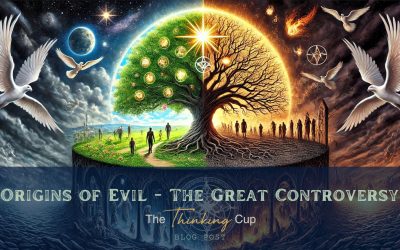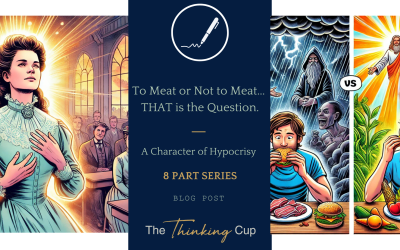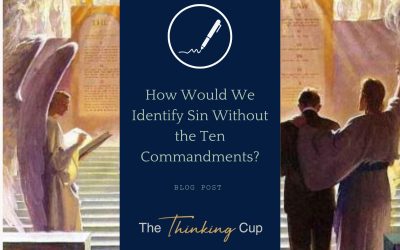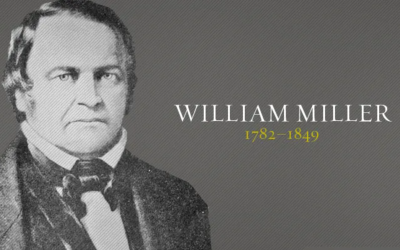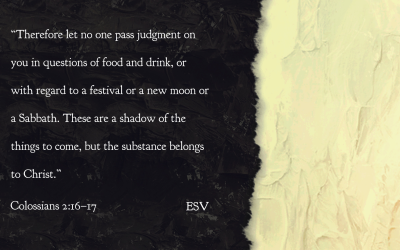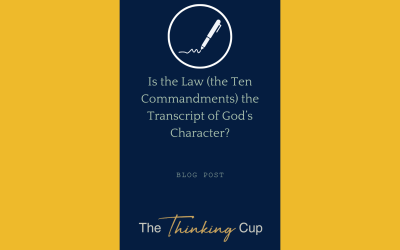Blog
The Enigma of 666: Adventism’s Mark Of The Beast (Part 2)
The Number 666 as a Symbol of Apostate Power For the SDA Church, the number 666 is understood as a symbol of human authority in rebellion against God, particularly relating to a system of religious and political power that usurps divine prerogatives. This...
The Enigma of 666: Decoding the Number of the Beast (Part 1)
Among the most intriguing and widely recognized biblical symbols is the number 666, referred to as the “number of the Beast” in Revelation 13:18. Despite its fame, its exact meaning remains a source of extensive debate. The passage states, “Let the one who has...
John’s Apocalypse: Through the Lens of the Old Testament
Have you ever wondered how the Book of Revelation connects with the profound stories, prophecies, and imagery of the Old Testament? These connections are not only fascinating but deeply transformative, offering fresh insights into God’s divine plan and His eternal...
The Origins of Evil – The Great Controversy?
"Faith is to believe what you do not see; the reward of this faith is to see what you believe." ~ St. Augustine Is Satan a real being? How does our belief around this thing shape our view in Scripture? The notion that a singular "personified evil...
Who Plays A Role In Atonement?
In Seventh-Day Adventist theology, sins were not forgiven at the cross itself; instead, the cross served as the place where the atoning sacrifice was made. According to their teachings, sins would only be erased during a process known as the Investigative Judgment,...
Drooping Flowers and Dead Leaves
Ellen White often made claims she attributed to ‘Divine’ revelation, but what happens when we critically examine these statements? Should such claims be accepted as truth simply because of their source? Many, including well-educated Seventh-day Adventists (SDAs), seem...
A Record Keeping God?
Last week at the dinner table, a 'wait a minute' moment popped up as our family read, talked, and contemplated day two of our family Advent book. I’m not sure if you have experienced this or not. These are moments when you realize something you have been taught or...
Ellen White, Astronomy, and ‘Divine’ Manipulation
In 1846, Ellen G. White, a prominent figure in the early Seventh-day Adventist (SDA) movement, reportedly experienced a "vision" in which she saw the solar system and its inhabitants. Several others, including Mrs. Truesdail, a committed member of the SDA church,...
Steps to Christ? Or Steps to Something Else?
The book Steps to Christ, supposedly authored by Ellen White, is THE book that an Adventist would hand someone if they wanted to evangelize another Christian or non-Christian. In fact, many have come to know Christ by reading this exact book. Ty Gibson's personal...
Sabbath Is An Eternal Sign, So You Must Keep It… FOREVER!
Should we understand the Sabbath as an ‘eternal sign’ described in Exodus 31:12-17? Exodus 31:12-17 serves as a foundational text for Adventists to argue that Sabbath-keeping is mandatory for salvation, universally binding, and eternal. However, this passage is often...
Adventism Is The Truth; Therefore, It Is Biblical, Right?
Adventism has a gnostic feel to its 'truth.' Let me explain what I mean. Gnosticism is a collection of ancient religious ideas and spiritual beliefs that emerged around the first and second centuries AD. It emphasizes personal spiritual knowledge, or gnosis, over...
How Would We Identify Sin Without the Ten Commandments?
It's been longer than I've wanted since I last posted an article. I'm learning the importance of understanding how people arrive at their interpretations of Scripture. Words matter, and a person's hermeneutics matters! When a faulty understanding of a word is applied...
Sin = Breaking the Ten Commandments???
There are numerous misconceptions, faulty assumptions, and flawed interpretations of Scripture within Adventism's Theological Framework. One of these faulty assumptions can be seen in the following statement: 1 John 3:4 (KJV) indicates that sin is defined as breaking...
A Study in Galatians: Paul’s Gospel VS Adventist Gospel
Imagine yourself in southern Turkey during the reign of Emperor Claudius, a time when the Roman Empire was at the height of its power and influence. The air is thick with the smell of incense burning in the many temples that fill the town. The streets are lined with...
A Prediction Affirmed: End Times and the Ottoman Empire
In 1838, Josiah Litch, a prominent figure in the Millerite movement, boldly declared a prophecy that sent shockwaves through the religious world. His prediction, based on a striking interpretation of Revelation 9:15, was nothing short of astonishing: the mighty...
In Light of the Law
The Seventh-day Adventist Church uses many faulty hermeneutical methods to reach some of its doctrinal conclusions. In this article, we will examine one of these conclusions. We can infer that when the terms 'law' or 'commandments' are mentioned positively in...
Christianity VS Seventh-day Adventism
Key Person or Founder, Date, Location(C) Jesus Christ. It was founded around AD 30-33 in the Judean province of Palestine (Israel today) under the Roman Empire. Followers of Jesus became known as Christians.(A) Primary organizers: James (1821-1881) and Ellen...
1° Matters
Words matter when it comes to theological statements! The Seventh-day Adventist Fundamental Beliefs book, Seventh-day Adventists Believe: An Exposition of the Fundamental Beliefs of the Seventh-day Adventist Church, makes a de facto claim: "As a reflection of God's...
Why I Speak Out
Many of my Adventist friends have questioned my focus on Ellen G. White in my writings. It's a valid concern, especially considering the wealth of fascinating Biblical topics one could explore. But it's important to remember that I was a devout Seventh-day Adventist...
Interpretations Taken Out of Context (Part 1)
I want to provide a few examples to unearth the best evidence for how Scripture is taken out of context, especially when using the Adventist Framework. Remember, while each of you might be coming from a different background, my goal is to show how interpreting the...
Push Back Against Ellen White is a Last Day Sign?
“Be careful how much you study; you might study yourself right out of the SDA Church!” What an interesting perspective on biblical studies, especially on researching the SDA Church’s history and the writings of Ellen G. White. Time has proven this statement to be more...
William Miller – Soul Condemned or Saved?
Some of you may have read my earlier post about William Miller and his influence on Ellen G. White in the early years. The Seventh-day Adventist church probably wouldn't have existed without William Miller. But most don't know Ellen White's additional odd statements...
I’m Right, You’re Right, Who’s Right? (Part 4)
While we have been working to understand better inspiration, methods of studying the Bible, and what context means in Biblical interpretation, I will direct our attention to how these ideas and concepts are used inside the Adventist framework of Biblical...
I’m Right, You’re Right, Who’s Right? (Part 3)
It is essential to recognize and flesh out what we bring to the text. We all do this, even if we don't realize it. Our personal presuppositions and worldview will shape how we see the ‘truths’ in the text. I have learned this reality all too well as I’ve emerged from...
I’m Right, You’re Right, Who’s Right? (Part 2)
Framing Inspiration to Deal with what is in the text Let's begin our discussion on inspiration by framing it as a process with two key participants. First, there's God, who is the ultimate source of the biblical texts. Then, there's the human author, who serves as the...
I’m Right, You’re Right, Who’s Right? (Part 1)
How can we be certain of the accuracy of our understanding of the biblical text? While I may not be fluent in Hebrew, Greek, or Aramaic, I place significant trust in the academic work of experts who have dedicated their lives to understanding these ancient Biblical...
Ellen White: More Failed Predictions (Part 3)
This is the third part of a series on testing Ellen G. White's statements about the soon return of Jesus Christ. I desire that you test the spirit and see if this woman was following God or being used as a deceptive tool. Please don't take my words as truth; read the...
Ellen White: Rewriting History (Part 2)
In the November 19, 1992 issue of the Adventist Review, the current SDA Church members were notified of the legitimacy of rewriting Ellen White. On page 8, Paul A. Gordon, secretary of the White Estate, asked: "Is it legitimate to change, abridge, or simplify Ellen...
Testing the Spirits
Dear friends, Don’t trust every spirit blindly, but carefully examine them to determine if they truly come from God, as many false prophets have spread throughout the world. (1 John 4:1) It's interesting that this verse instructs believers to "test the spirits" to...
Ellen G. White: False Date Setting, Rewriting History, and a Fascination with End Time’s Predictions (Part 1)
It's a pretty weighty and bold statement to claim that Ellen G. White is a False Prophet. Many have told me that I would have to stand before God regarding my decision and how I'm approaching these topics. I guess I'm a little confused as to why I would stand before...
Who is Lucinda Burdick?
Note: Lucinda Burdick and Ellen Harmon [White] were close friends during the mid-1840s. Mrs. Burdick, a pastor's wife, had many opportunities to hear Mrs. White's prophecies. This eyewitness account by Mrs. Lucinda Burdick was given in 1908 and notarized at the...
Investigative Judgment Analyzed (Part 2)
Claimed For All, But Bypassed By Some Now that we have understood the doctrine and analyzed whether it is coherent with Scripture, we will explore another aspect of investigative judgment. If you haven't read Part 1, ensure you do so before diving into the people we...
The Investigative Judgment Analyzed (Part 1)
I realize that if you have been following my journey, you have probably read some pretty direct and bold assertions about the most important author in Adventism: Ellen G. White. CLAIM: Ellen G. White is a liar, bears a false witness, and is a false prophetess. I...
The Truth Will Set You Free!
One of the most important and bravest moments of my Christian life happened two weeks ago. A little context: a person's childhood helps mold them into the person they will become. Even the Bible makes it clear... right? "Train up a child in the way he should go; even...
The Erroneous Claim Behind the Miller Chart
Dear Friends and Family, I write these blog articles and posts because of my pursuit of truth and a deep love for all of you! My statements and conclusions are from years of study and research, but an intentional motivation to be bold and honest about the early...
Why I Left the Seventh-day Adventist Church
Honestly, the last few days have been mentally tough. It’s difficult when we have dedicated our entire lives to the Seventh-day Adventist Church to be met with loss of friends, hostility, angst, and bitterness, all because we are convinced that many of the church's...
Adam, Eve, and White’isms
These questions probably don’t seem very important. After all, if someone opens the Bible and reads what the inspired scriptures say, the answers are pretty straightforward. I remember growing up as a kid and hearing the answers to the first questions differently. It...
Ellen White’s Covenant Keeping Abraham
Many of us are familiar with the covenant that was made with Abraham in Genesis 15. We at least know that God made covenants with certain individuals and groups in the Old Testament. It’s important to understand what a covenant was in the Ancient Near Eastern (ANE)...
Was Jesus a Sinner?
The question of the day is this, “Was Jesus a sinner?” Now, if you're a Christian, I'm sure you're wondering why such a thing would even need to be asked, which is why today we're going to look at how the Seventh Day Adventist Church's prophetess, Ellen G. White, said...
Ellen G. White Corrects Inaccurate Interpretations, Right?
Ellen who? Ellen G. White, you know her, right? Some reading this post won't even know who Ellen G. White is and what level of importance is placed on her inside the Adventist church. In short, Ellen G. White is the founder of the Seventh-Day Adventist Church and is...
Did the Catholic Church Change the Sabbath to Sunday?
Seventh-day Adventists claim that the weekly Sabbath was changed by Rome and needs to be restored. This idea was first made popular by Ellen G. White and the early founders of the Seventh-day Adventist Church. [1] And yet, everything Ellen G. White and the Seventh-day...
History is History! Right?
History is History. Right? And when we learn about church history from the Church, it's consistently accurate! Right? As a kid, I remember sitting in many SDA Revelation Seminars and learning about the "change of the Sabbath day" from Sabbath to Sunday. As many of my...
A Shadow of Things to Come
Therefore let no one pass judgment on you in questions of food and drink, or with regard to a festival or a new moon or a Sabbath. 17 These are a shadow of the things to come, but the substance belongs to Christ. (Col 2:16–17) It's both spiritually energizing and...
I Can Argue Any Doctrine Through a Verse Taken Out of Context! (Part 2)
We are continuing our discussion on context and how the context of a Bible text is misused in many Christians' discussions but most certainly is misused in the Adventist framework. (If you need to catch up on Part 1 you can find it here.) Here is the faulty...
I Can Argue Any Doctrine Through a Verse Taken Out of Context! (Part 1)
Adventists and other Christians knowingly and unknowingly ignore Scripture's contexts (the covenantal, historical, cultural, theological, political, social, audient, immediate context, and the context that created the verse being quoted or discussed). This faulty...
The Blessings of the Law of Messiah
You've heard me speak about the stark contrast between the Law of Moses (Mosaic Law) and the Law of Messiah. Many of you have expressed a desire for a deeper understanding of the Law of Messiah, and I'm here to share some thoughts on this profound theological...
Jesus is the Only Transcript of God’s Character.
"Jesus Christ is the only human embodiment of God's character. As such, He is the only transcript of God’s character." Based on my understanding of what Scripture teaches and how many of the authors theologize about Jesus in the New Testament, He is the only Person...
Is the Law (the Ten Commandments) the Transcript of God’s Character?
Adventists argue as de facto that the Law of God is the transcript of God’s character. They do this by stating the case and then showing that certain qualities of God exist in the Law. But it would be important for us to start at the beginning of this argument. What...




